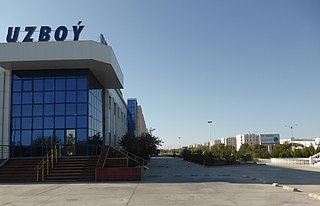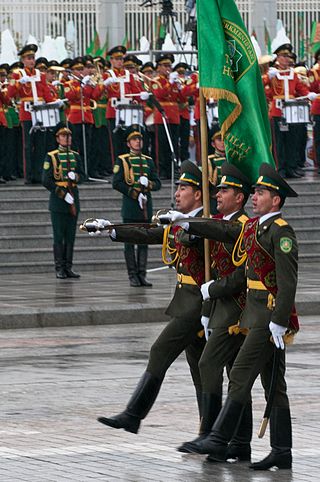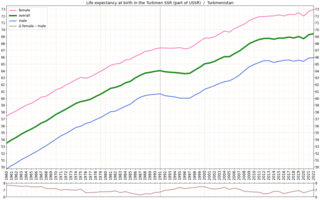Related Research Articles

The history of Turkmenistan traditionally began with the arrival of Indo-European Iranian tribes around 2000 BC. Early tribes were nomadic or semi-nomadic due to the arid conditions of the region, preventing widespread adoption of agriculture. The steppe culture in Central Asia was an extension of a larger Eurasian series of horse cultures which spanned the entire spectrum of language families, including the Indo-Europeans and Turko-Mongol groups. Some of the known early Iranian tribes included the Massagatae, the Scythians/Sakas, and early Soghdians, who were most likely precursors of the Khwarezmians. Turkmenistan was a passing point for numerous migrations and invasions by tribes, which gravitated towards the settled regions of the south, including ancient Mesopotamia, Elam, and the Indus Valley civilization.

The politics of Turkmenistan nominally takes place in the framework of a presidential republic, whereby the President of Turkmenistan is nominally both head of state and head of government. However, as of 21 January 2023 a "national leader" was appointed who chairs an independent People's Council (viz.) with authority to amend the constitution, and who exercises supreme political authority. No true opposition parties are allowed; every registered political party supports the third and current President Serdar Berdimuhamedow. The country is frequently described as a totalitarian state.

The Armed Forces of Turkmenistan, known informally as the Turkmen National Army is the national military of Turkmenistan. It consists of the Ground Forces, the Air Force and Air Defense Forces, Navy, and other independent formations.

Turkmenistan is a country located in Central Asia, bordered by Kazakhstan to the northwest, Uzbekistan to the north, east and northeast, Afghanistan to the southeast, Iran to the south and southwest and the Caspian Sea to the west. Ashgabat is the capital and largest city. It's one of the 7 independent Turkic states. The population is about 6 million, the lowest of the Central Asian republics, and Turkmenistan is one of the most sparsely populated nations in Asia.

The Turkmen Soviet Socialist Republic, also known as Soviet Turkmenistan, the Turkmen SSR, Turkmenistan, or Turkmenia, was one of the constituent republics of the Soviet Union located in Central Asia existed as a republic from 1925 to 1991. Initially, on 7 August 1921, it was established as the Turkmen Oblast of the Turkestan ASSR before being made, on 13 May 1925, a separate republic of the USSR as the Turkmen SSR.

The Ruhnama, or Rukhnama, translated in English as Book of the Soul, is a two volume work written by Saparmurat Niyazov, the president of Turkmenistan from 1990 to 2006. It was intended to serve as a tool of state propaganda, emphasising the basis of the Turkmen nation.

Turkmenistan's human rights record has been heavily criticized by various countries and scholars worldwide. Standards in education and health declined markedly during the rule of President Saparmurat Niyazov.

Daşoguz, formerly known as Tashauz and Dashkhovuz, is a city in northern Turkmenistan and the capital of Daşoguz Province. The Uzbekistan border is about 10 km away.

The Ministry for National Security or MNS is the secret police agency for the government of Turkmenistan. It is composed largely of the remnants of KGB organs left over after the collapse of the Soviet Union; its functions remain largely the same as well. The MNB and the national police force are under the direction of the Ministry of Internal Affairs. Until 2002 was known as the KNB.
The Turkmen of Turkmenistan, are predominantly Muslims. According the U.S. Department of State's International Religious Freedom Report for 2019,
According to U.S. government estimates, the country is 89 percent Muslim, 9 percent Eastern Orthodox, and 2 percent other. There are small communities of Jehovah's Witnesses, Shia Muslims, Baha’is, Roman Catholics, the International Society for Krishna Consciousness, and evangelical Christians, including Baptists and Pentecostals. Most ethnic Russians and Armenians identify as Orthodox Christian and generally are members of the Russian Orthodox Church or Armenian Apostolic Church. Some ethnic Russians and Armenians are also members of smaller Protestant groups. There are small pockets of Shia Muslims, consisting largely of ethnic Iranians, Azeris, and Kurds, some located in Ashgabat, with others along the border with Iran and in the western city of Turkmenbashy.
The Constitution provides for freedom of religion and does not establish a state religion; however, in practice the Government imposes legal restrictions on all forms of religious expression. All groups must register in order to gain legal status; unregistered religious activity is illegal and may be punished by administrative fines. While the 1996 law on religion and subsequent 1999 amendments had effectively restricted registration to only the two largest groups, Sunni Muslim and Russian Orthodox, and criminalized unregistered religious activity, presidential decrees issued in 2000 dramatically reduced the numerical thresholds for registration and abolished criminal penalties for unregistered religious activity; civil penalties remain. As a result, nine minority religious groups were able to register, and the Turkmenistan government has permitted some other groups to meet quietly with reduced scrutiny.

The following outline is provided as an overview of and topical guide to Turkmenistan:

In the post-Soviet era, reduced funding has put the health system in poor condition. In 2002 Turkmenistan had 50 hospital beds per 10,000 population, less than half the number in 1996. Overall policy has targeted specialized inpatient facilities to the detriment of basic, outpatient care. Since the late 1990s, many rural facilities have closed, making care available principally in urban areas. President Niyazov’s 2005 proposal to close all hospitals outside Ashgabat intensified this trend. Physicians are poorly trained, modern medical techniques are rarely used, and medications are in short supply. Doctors and pharmacists were required to study the works of Avicenna and tested on their knowledge of Saparmyrat Niyazov's spiritual writings, the Ruhnama. In 2004 Niyazov dismissed 15,000 medical professionals, exacerbating the shortage of personnel. In some cases, professionals have been replaced by military conscripts. Private health care is rare, as the state maintains a near monopoly. Free public health care was abolished in 2004.

The Republic of Uzbekistan has an embassy in Ashgabat. Turkmenistan has an embassy in Tashkent. Both countries were previously subordinated republics of the Soviet Union as Turkmen Soviet Socialist Republic and Uzbek Soviet Socialist Republic before its collapse in 1991.

Saparmurat Atayevich Niyazov, also known as Türkmenbaşy, was a Turkmen politician who ruled Turkmenistan as a dictator from 1985 until his death in 2006. He was first secretary of the Turkmen Communist Party from 1985 until 1991 and supported the 1991 Soviet coup attempt. He continued to rule Turkmenistan for 15 years after independence from the Soviet Union in 1991.

The list of Turkmenistan-related articles is below

Corruption in Turkmenistan is considered by many independent sources as a serious problem. The country is near the bottom of several annual indices that measure corruption, including The Wall Street Journal's Index of Economic Freedom.

The Ministry of Defense of Turkmenistan is a government agency under the Armed Forces of Turkmenistan which is the executive body in implementing defence policies in Turkmenistan. The current Minister of Defense is Major General Begenç Gündogdyýew. It was founded in January 1992 with the assistance of the Russian Armed Forces.

The Turkmenistan–Uzbekistan border is the border between the countries of the Republic of Turkmenistan and the Republic of Uzbekistan. At 1,793 km, it is Turkmenistan's longest border and Uzbekistan's second longest. The border runs from the tripoint with Kazakhstan to the tripoint with Afghanistan.
References
- 1 2 3 4 5 6 Central Asia: 'Fathers are crying in Turkmenistan, and children are crying here' EurasiaNet
- 1 2 Turkmenistan: State Interfering In Religious Life Of Ethnic Uzbeks Radio Free Europe/Radio Liberty
- ↑ "Memoir In the Court of Turkmenbashi". Eurasianet. Retrieved 20 Aug 2021.
- ↑ "Bad Days for Russians in Turkmenistan". Los Angeles Times. 28 June 2003. Retrieved 28 June 2003.